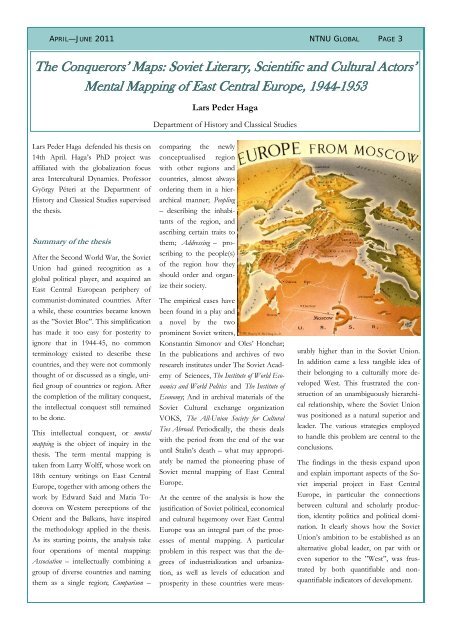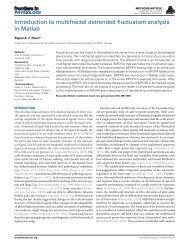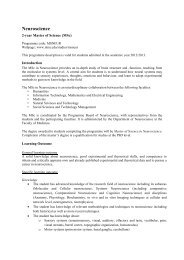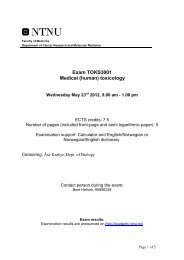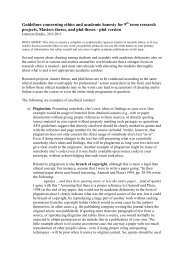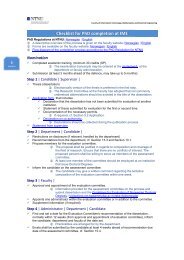Annual Report 2011 - NTNU
Annual Report 2011 - NTNU
Annual Report 2011 - NTNU
You also want an ePaper? Increase the reach of your titles
YUMPU automatically turns print PDFs into web optimized ePapers that Google loves.
APRIL—JUNE <strong>2011</strong> <strong>NTNU</strong> GLOBAL PAGE 3<br />
The Conquerors’ Maps: Soviet Literary, Scientific and Cultural Actors’<br />
Mental Mapping of East Central Europe, 1944-1953<br />
Lars Peder Haga<br />
Department of History and Classical Studies<br />
Lars Peder Haga defended his thesis on<br />
14th April. Haga’s PhD project was<br />
affiliated with the globalization focus<br />
area Intercultural Dynamics. Professor<br />
György Péteri at the Department of<br />
History and Classical Studies supervised<br />
the thesis.<br />
Summary of the thesis<br />
After the Second World War, the Soviet<br />
Union had gained recognition as a<br />
global political player, and acquired an<br />
East Central European periphery of<br />
communist-dominated countries. After<br />
a while, these countries became known<br />
as the ”Soviet Bloc”. This simplification<br />
has made it too easy for posterity to<br />
ignore that in 1944-45, no common<br />
terminology existed to describe these<br />
countries, and they were not commonly<br />
thought of or discussed as a single, unified<br />
group of countries or region. After<br />
the completion of the military conquest,<br />
the intellectual conquest still remained<br />
to be done.<br />
This intellectual conquest, or mental<br />
mapping is the object of inquiry in the<br />
thesis. The term mental mapping is<br />
taken from Larry Wolff, whose work on<br />
18th century writings on East Central<br />
Europe, together with among others the<br />
work by Edward Said and Maria Todorova<br />
on Western perceptions of the<br />
Orient and the Balkans, have inspired<br />
the methodology applied in the thesis.<br />
As its starting points, the analysis take<br />
four operations of mental mapping:<br />
Association – intellectually combining a<br />
group of diverse countries and naming<br />
them as a single region; Comparison –<br />
comparing the newly<br />
conceptualised region<br />
with other regions and<br />
countries, almost always<br />
ordering them in a hierarchical<br />
manner; Peopling<br />
– describing the inhabitants<br />
of the region, and<br />
ascribing certain traits to<br />
them; Addressing – proscribing<br />
to the people(s)<br />
of the region how they<br />
should order and organize<br />
their society.<br />
The empirical cases have<br />
been found in a play and<br />
a novel by the two<br />
prominent Soviet writers,<br />
Konstantin Simonov and Oles’ Honchar;<br />
In the publications and archives of two<br />
research institutes under The Soviet Academy<br />
of Sciences, The Institute of World Economics<br />
and World Politics and The Institute of<br />
Economy; And in archival materials of the<br />
Soviet Cultural exchange organization<br />
VOKS, The All-Union Society for Cultural<br />
Ties Abroad. Periodically, the thesis deals<br />
with the period from the end of the war<br />
until Stalin’s death – what may appropriately<br />
be named the pioneering phase of<br />
Soviet mental mapping of East Central<br />
Europe.<br />
At the centre of the analysis is how the<br />
justification of Soviet political, economical<br />
and cultural hegemony over East Central<br />
Europe was an integral part of the processes<br />
of mental mapping. A particular<br />
problem in this respect was that the degrees<br />
of industrialization and urbanization,<br />
as well as levels of education and<br />
prosperity in these countries were measurably<br />
higher than in the Soviet Union.<br />
In addition came a less tangible idea of<br />
their belonging to a culturally more developed<br />
West. This frustrated the construction<br />
of an unambiguously hierarchical<br />
relationship, where the Soviet Union<br />
was positioned as a natural superior and<br />
leader. The various strategies employed<br />
to handle this problem are central to the<br />
conclusions.<br />
The findings in the thesis expand upon<br />
and explain important aspects of the Soviet<br />
imperial project in East Central<br />
Europe, in particular the connections<br />
between cultural and scholarly production,<br />
identity politics and political domination.<br />
It clearly shows how the Soviet<br />
Union’s ambition to be established as an<br />
alternative global leader, on par with or<br />
even superior to the ”West”, was frustrated<br />
by both quantifiable and nonquantifiable<br />
indicators of development.


